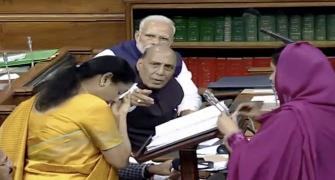‘The market was expecting the Budget to do more, given the domestic economic slowdown and global uncertainty. Over the next few days, the market is expected to absorb the volatility.’

Market participants are expecting near-term volatility with the Union Budget skipping sector-specific stimulus packages for stressed segments such as real estate and non-bank financial services, and failing to meet domestic investors’ expectations on relaxing long-term capital gains (LTCG) tax.
Experts say selling pressure on the stock market may continue on Monday, even though $173-billion liquidity infusion by China’s central bank to boost its economy could provide some cushion.
On Saturday, the benchmark indices closed near their day’s lows, indicating further selling pressure on the following trading day. The Sensex ended 988 points, or 2.43 per cent, lower at 39,736 points, while the Nifty50 fell 300 points, or 2.51 per cent.
“The market was expecting the Budget to do more, given the domestic economic slowdown and global uncertainty. Over the next few days, the market is expected to absorb the volatility,” said Gaurav Dua, head of capital market strategy of Sharekhan by BNP Paribas.
Foreign brokerages expect the risk-off stance to continue at least in the short term.
“In the near term, the markets may gravitate back towards large-cap quality and defensive stocks. However, in the medium term, we expect equities to be largely driven by underlying mid-teens earnings growth,” said Goldman Sachs in a note.
The broking house has maintained the Nifty target of 13,000 by the end of 2020.
Market experts say they are likely to be in the wait-and-watch mode as volatility can take a few days to subside.
“Too early to say whether Budget Day volatility was a one-day event. We will have to see the market reaction this week as several institutional investors, especially foreign portfolio investors (FPIs), may not have participated as it was a Saturday,” said Krishna Sanghavi, chief investment officer (CIO) at Mahindra Mutual Fund.
Further, fund managers say a broader market recovery could get delayed as markets digest the implications of the Budget.
Flows from foreign portfolio investors (FPIs) can come back into the markets as the Budget relaxed taxation for overseas investors.
For FPIs, dividend distribution tax would be calculated at the treaty agreements, and not attract domestic taxation rates.
According to experts, this can have a material impact on the net equity returns of FPIs. On Saturday, FPIs sold Rs 1,200 crore worth of equities.
“We are generally positive on the Budget and we believe the market will gradually understand the positives from the Budget, after the knee-jerk reaction,” said Shankar Sharma, vice-chairman and joint managing director of First Global.
Experts add that once the Budget-related noise abates, the market focus is likely to shift to earnings and global cues. “Future FPI inflows will depend on how economic and earnings growth play out,” said a fund manager.
For domestic investors, it was expected that the holding period for calculating LTCG tax on equity would be increased to two years.
The stock market could find a stable footing on Monday as the China market is resuming trade and the Chinese government will be launching $173 billion worth of liquidity.
Also, experts say the fallout of novel coronavirus will have an impact on emerging markets and India in the coming days.
Photograph: Danish Siddiqui/Reuters.









